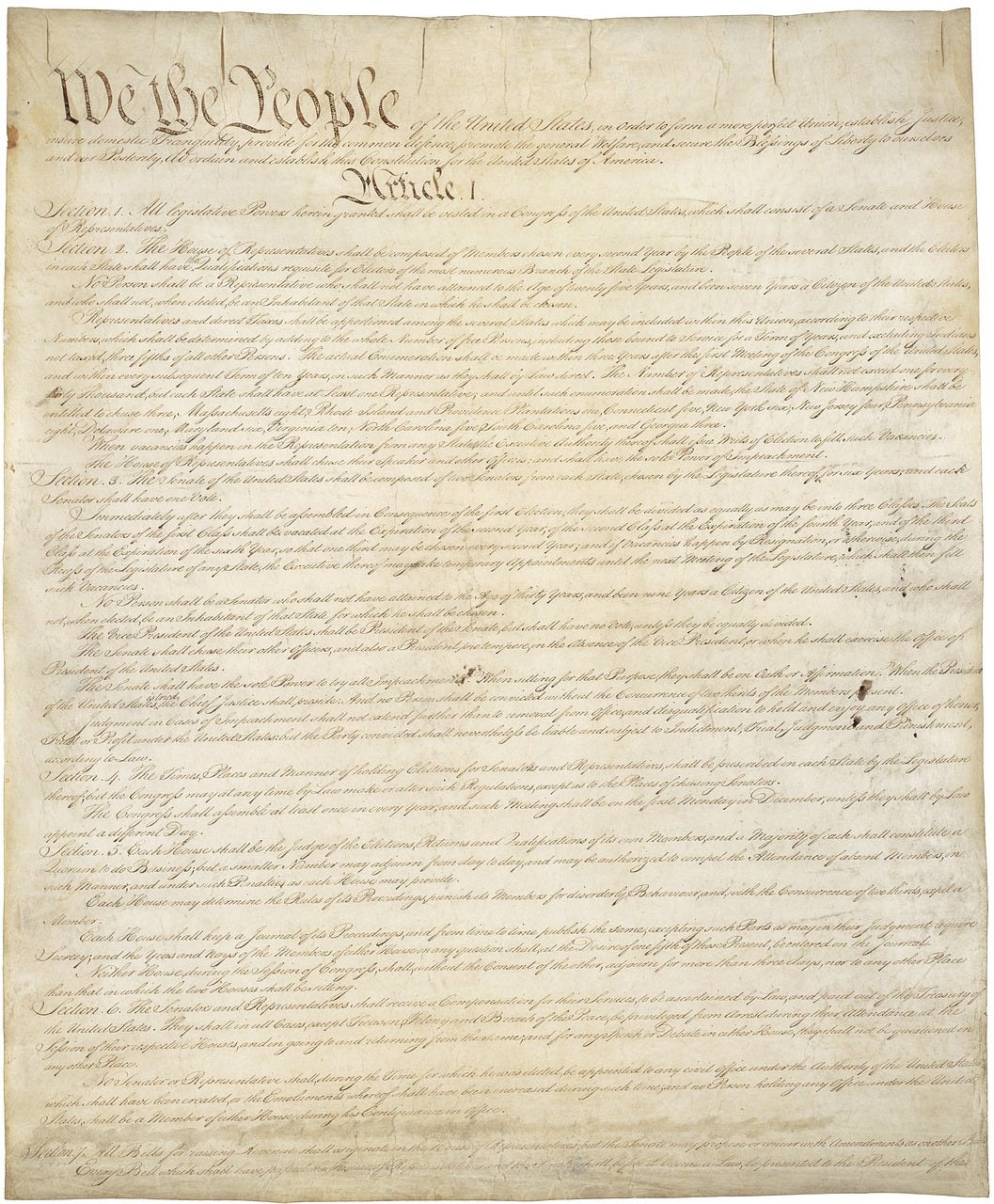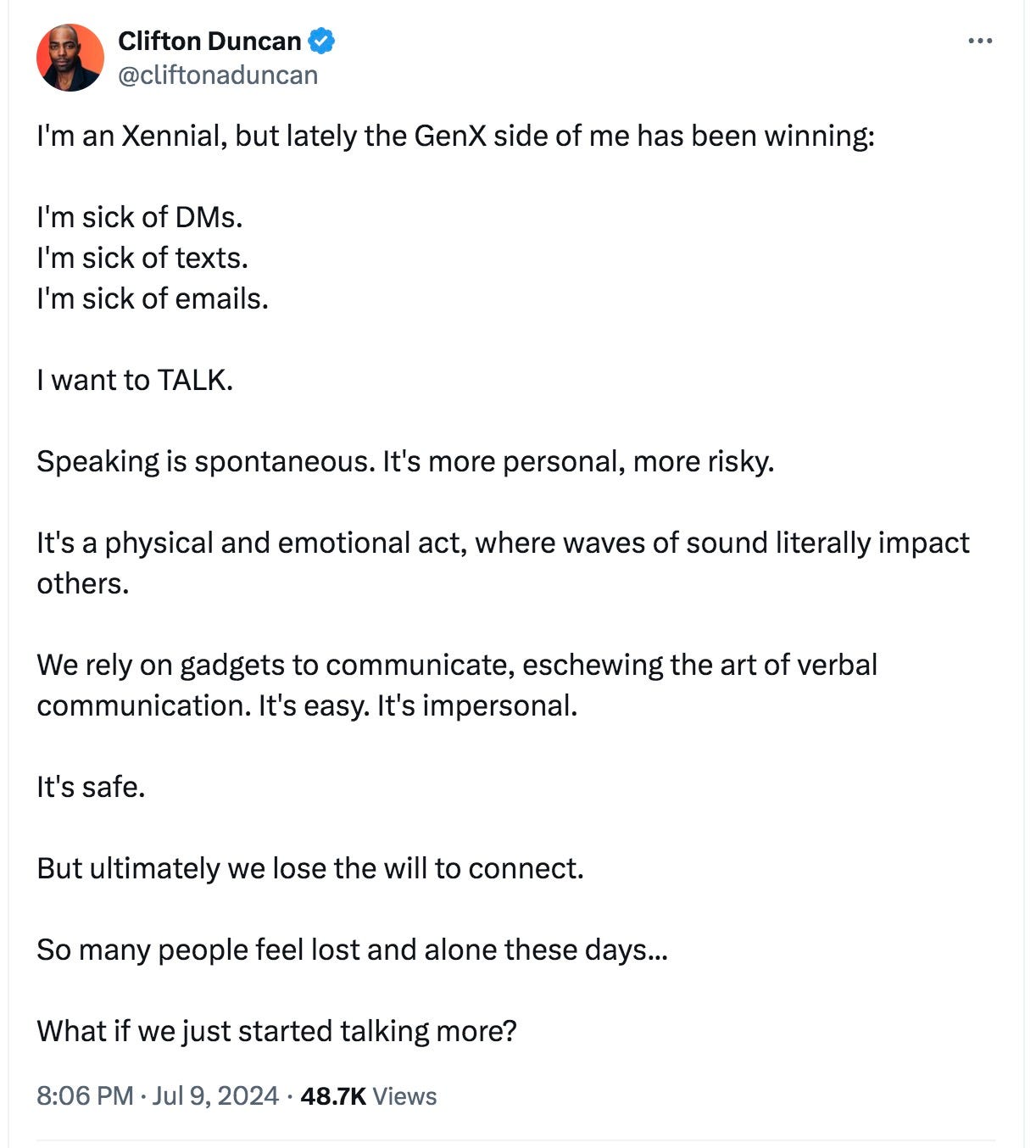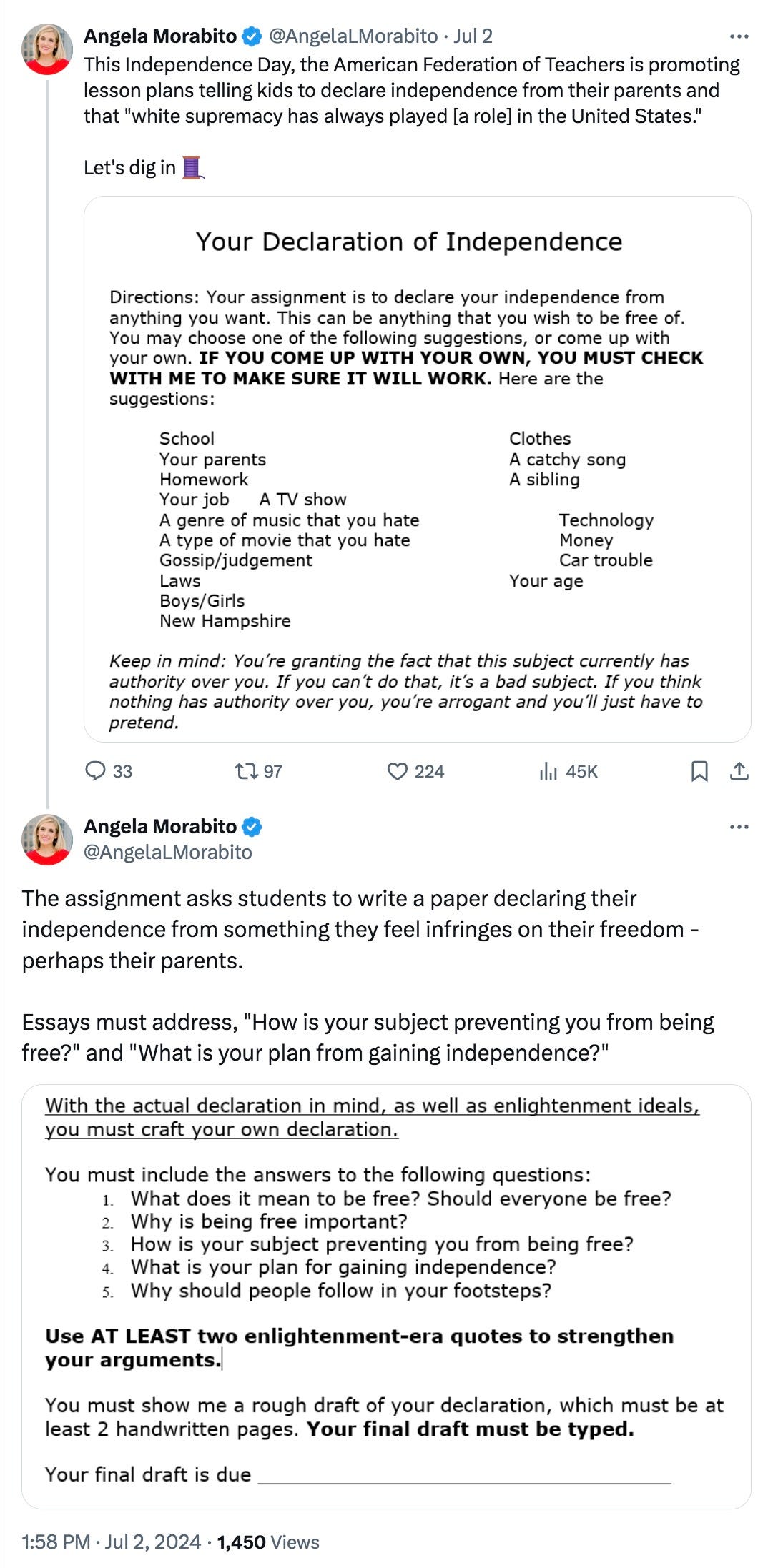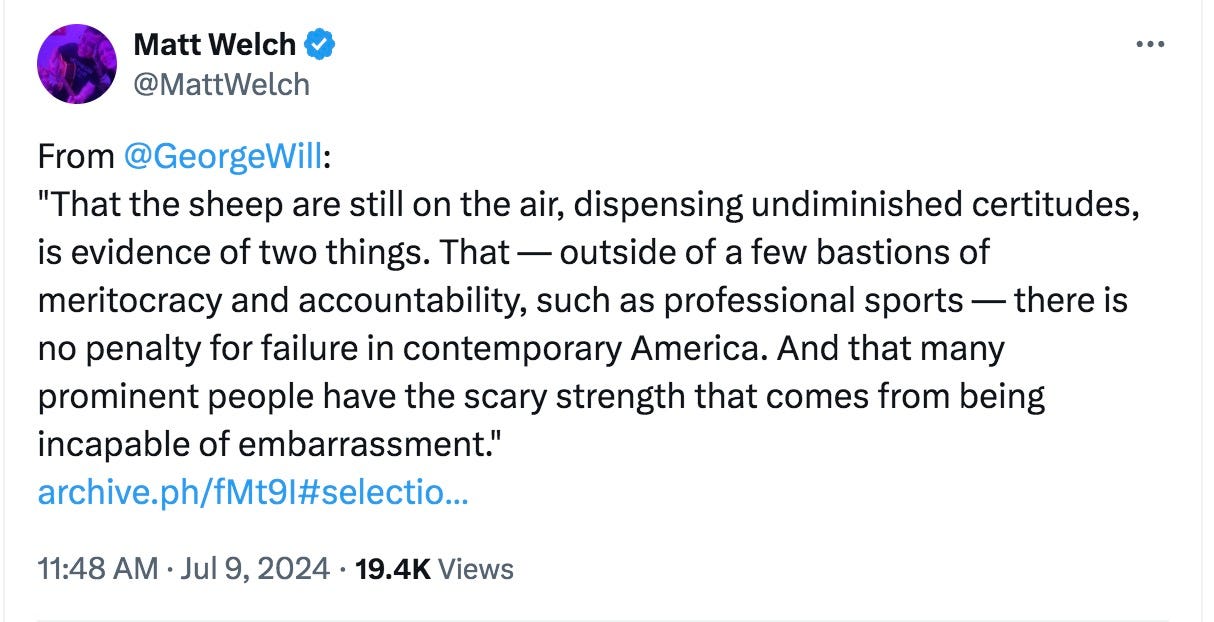E-Pluribus | July 11, 2024
The bureaucratocracy takes it on the chin; the left is reaping what it sowed; and the limits of politics in the classroom.
A round-up of the latest and best musings on the rise of illiberalism in the public discourse:
Adam White: Loper Bright and the End of Administrative Exceptionalism
Remember the good ole days when the three branches of government actually carried out the functions the Constitution assigned each of them? A recent Supreme Court ruling, if implemented as the opinion reads, should bring about a return to those days, writes Adam White for The Dispatch.
Four decades ago in Chevron v. Natural Resources Defense Council, the Supreme Court directed lower courts to let administrative agencies take the lead in interpreting regulatory laws. Even if judges thought an alternative interpretation better suited the original meaning of a given piece of legislation, the landmark 1984 case held that courts should defer to the agency’s reasonable interpretation of a statute’s ambiguous language.
Loper Bright v. Raimondo, decided at the end of the recently concluded Supreme Court term, marked the end of all that. “Chevron is overruled,’’ the court held in a 6-3 majority opinion by Chief Justice Roberts. “Courts must exercise their independent judgment in deciding whether an agency has acted within its statutory authority.” No more deferring to an agency’s interpretation just because it is a “reasonable” one: “In the business of statutory interpretation, if it is not the best, it is not permissible.”
To observers not already immersed in the debates surrounding Chevron and Loper Bright, the court’s holding might seem commonsensical. Isn’t the court’s job, going all the way back to Marbury v. Madison, to interpret laws? Why, then, are some critics painting Loper Bright as an imperialistic judicial power grab that “gutted the power of federal agencies,” while some optimists see it as an opportunity to make the federal government less divisive, erratic, and brutal?
That courts need to independently interpret laws is indeed common sense—outside of modern administrative law (i.e., the body of law governing regulatory agencies’ procedures, fact-finding, policymaking, and legal interpretations). But within administrative law, Loper Bright is undoubtedly a significant development, even if it’s not the “earthquake” that some commentators have made it out to be.
Loper Bright marks the end of what one might call “administrative exceptionalism.” In most areas of law, judges are expected to offer an authoritative interpretation of ambiguous statutes without an easy explanation. But since Chevron—or arguably since even decades before—courts treated regulatory statutes differently. Under Chevron, judges have often treated statutory ambiguity as a reallocation of power. It meant that the EPA, OSHA, and other administrative agencies, not the courts, would determine the meaning of a law—and redetermine it later, differently, if a given agency changes its mind.
[. . .]
Ironically, critics of the Roberts Court complain that Loper Bright will destabilize the law. Regulatory programs that agencies had once justified with “reasonable” interpretations of ambiguous statutes, they worry, might not pass muster under the courts’ newly undeferential interpretations of those laws. Furthermore, different courts will inevitably reach different conclusions in their search for the “best” interpretation of any given statute.
This surely will create some uncertainty. That said, Loper Bright’s critics tend to minimize or ignore the far greater uncertainty that Chevron fostered: the radical regulatory uncertainty that carried from one administration to the next.
Read it all.
Barton Swaim: Biden’s Frailty and the Political Price of Insincerity
Trump supporters like to say “we didn’t make the rules” when turning the left’s tactics against them, but sometimes it’s just a matter of natural consequences. At The Wall Street Journal, Barton Swaim says that when it comes to the problem of Joe Biden’s age-related troubles, Democrats are just getting a taste of their own medicine.
Any mildly observant person could see four years ago that Mr. Biden had declined further than a commander in chief should. These pages noted Mr. Biden’s diminished state during and after his 2020 campaign. In the 2012 debate with Paul Ryan, the editorial board remarked on Nov. 19, 2020, Mr. Biden “was aggressive and confident. In 2020, in the rare times he speaks off the cuff without a teleprompter, he looks more tentative, as if grasping for an argument or words that he knows are around here somewhere.”
Democrats disregarded this and 10,000 similar observations because they took them to be insincere, and the political left has become so accustomed to insincerity as not to recognize its opposite. On the left—particularly in the New York Times and other elite outlets—substantive complaints are routinely presented as procedural or ethical ones. Rather than make a straightforward argument that a person or policy is wrong on the merits, elected Democrats, following the media’s lead, typically raise technical or otherwise secondary objections they plainly don’t care about.
Any time a Republican president nominates a judge to the Supreme Court, Democrats can be counted on to fly quickly past the substantive reasons for their opposition and invent ethical lapses that, even if true, wouldn’t bother them in any other situation. No Senate Democrat cared if Brett Kavanaugh behaved badly at some unspecified time and place in the 1980s. They wanted him defeated.
[. . .]
Our pundit class and Democratic officeholders appear to believe that everyone else in the political realm thinks the way they do. Most don’t. When right-leaning commentators pointed out that Mr. Biden appeared weak and confused, they did so because Mr. Biden appeared weak and confused. Democrats evidently thought Republicans were making it up and only wanted to get rid of Mr. Biden.
[. . .]
Having convinced themselves that the president’s infirmity was a right-wing invention, Democrats find themselves in the unenviable position of having to acknowledge the truth of what their opponents have been saying for years. The whole mess might have been avoided if Democrats had credited their critics with sincerity.
Read the whole thing.
Jessie Appleby: Faculty can address Israeli-Palestinian conflict in class assignments, but there are limits
If colleges are meant to prepare students for the real world, there should be no expectation that the process will be comfortable or not involve challenges to a student’s values and worldviews. While it’s possible for professors to cross the line, Jessie Appleby for the Foundation for Individual Rights & Expression argues that academic freedom gives them tremendous leeway in course materials as long as coercion and retaliation don’t enter the equation.
The manner in which faculty tackle contested or controversial issues in college classrooms is a source of perennial debate. That debate over preferred pedagogy reignited last month when a nonprofit organization accused a public college in California of violating students’ First Amendment rights based on incidents in which two professors seemingly injected their personal views on hot-button political issues into assigned classwork.
StandWithUs, a pro-Israel nonprofit, wrote Santa Monica College alleging the anti-Israel bias reflected in two professors’ classroom assignments violated students’ First Amendment rights against compelled speech and viewpoint discrimination. The group argued that many students believe they are required to agree with the two professors’ views to successfully pass their courses.
[. . .]
StandWithUs reasoned:
It is clear from both assignments that Serna and Ahmadpour proceed from the premise that their political opinions are facts that must be unquestioningly accepted by students as they complete their coursework. . . . Here, these professors are requiring students to adopt their opinions (that Israel is engaging in “ongoing destruction and genocide” or occupying stolen lands) and to support the establishment of encampments on SMC grounds. That is constitutionally impermissible.
Is StandWithUs correct? Does it violate students’ First Amendment rights to assign coursework which reflects professors’ own particular viewpoint about a contested issue? More specifically, did Ahmadpour and Serna run afoul of the First Amendment by assigning work in which the existence of an ongoing genocide in Gaza and the righteousness of campus encampments were assumed facts?
The answer, in short, is no, in the absence of evidence that students were required to publicly parrot the professors’ views or suffered retaliation for voicing opposing views.
Based on the facts described by StandWithUs, there is currently insufficient evidence to suggest Ahmadpour and Serna violated the First Amendment. College curricula generally receive the protection afforded by academic freedom — both that of the institution to manage its own academic affairs without unreasonable outside government interference and that of individual professors to teach without unreasonable interference from administrators.
Students, of course, retain their own First Amendment rights. That means instructors cannot require students to express agreement with a particular view or penalize students simply for expressing a different viewpoint. But merely asking students to study or discuss materials with which they disagree as part of their academic coursework, or even asking them to adopt controversial views for purposes of an assignment, is not by itself unconstitutional viewpoint discrimination or compelled speech.
While asking students to take argumentative positions that conform to a teacher’s own views on a hot-button issue may risk discomfiting those with opposing views, it does not by itself violate the First Amendment.
Read it all here.
Around Twitter (X)
Here’s actor Clifton Duncan with some thoughts on that obsolete form of communication: talking!
The American Federation of Teachers promoted a new twist on independence this July 4th. The Defense of Freedom Institute’s Angela Morabito has the details:
And. finally, via Matt Welch, here’s George Will on lack of accountability in American institutions, in this case, the media:









